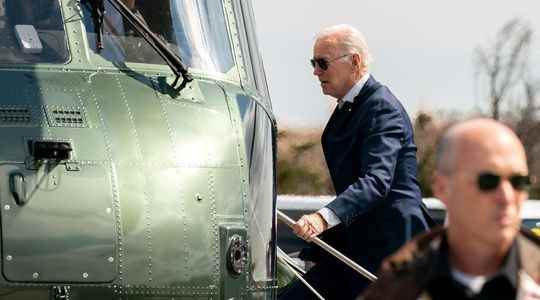For ordinary mortals, the distinction is quite subtle. The United States announced in mid-March that they were going to deliver new military equipment to Ukraine, but only “defensive” weapons, not “offensive”. Clearly, America sends neither bombers nor tanks which would be seen as a declaration of war by the Kremlin. On the other hand, it provides him with drones and anti-missile batteries which nevertheless have a similar function: the annihilation of Russian armored vehicles and aviation.
Since the start of the invasion, the American president has been performing a clever balancing act. He, who when he came to power had promised to protect democracy, strengthen alliances and restore the country to its role as world leader, pledged to defend Ukraine. He remained marked, while he was vice-president, by the late reaction and without much impact of the United States after the annexation of Crimea by the Russians in 2014.
“For me, he deserves congratulations for having been able to coordinate the allies and impose the harshest possible sanctions, affirms Angela Stent, specialist in Russia at the think tank Brookings Institution. It was well planned. The administration learned the lessons of the chaotic withdrawal from Afghanistan.” Joe Biden has focused on three areas: providing billions of dollars in military assistance to Ukraine, countering Moscow with unprecedented economic sanctions and reinvigorating NATO. All this while avoiding escalation and a face-to-face with Vladimir Putin.
So far, he has succeeded in rallying behind him Congress and public opinion, a sacred union unprecedented since the attacks of September 11. Most Republicans support him. This does not prevent them from accusing him of being too “weak”. Some however, and not only among the conservatives, believe that Europe and the United States are too timorous and are pushing for more interventionism, without however advocating the sending of GIs to Ukraine.
“Putin is not going to risk a battle with NATO”
Michael McFaul, ex-ambassador to Russia under Barack Obama, in a gallery at the washington post, calls for “more weapons, more sanctions”. For him, the risk of nuclear retaliation is “a very low probability.” Given the poor performance of his army, Putin is not going to risk a battle with NATO. “He may be surly and disturbed but he is not suicidal,” he adds.
Eliot Cohen, an ex-hawk of the Bush administration deplores him, in the magazine The Atlantic“Biden’s heartbreaking hesitation”. He calls for the transfer of the Polish MiGs to kyiv – which the White House refused for fear of provoking the Russians – while acknowledging that it is not known whether the Ukrainians know how to “operate them successfully”. “Sometimes in a war you do things to get a message across and boost morale even though they’re not militarily optimal,” he wrote. Western leaders, he said, would be better off claiming that all options are on the table rather than just talking about their fear of escalation.
Joe Biden’s tightrope walker becomes increasingly acrobatic as Moscow practices scorched earth tactics. “It will be difficult to maintain the balance as the conflict drags on. The president will come under pressure in the United States to become more involved and will have difficulty maintaining the unity of the allies”, resumes Angela Stent .
“There is unfortunately no miracle solution”
Hence this NATO summit organized urgently at the request of Biden. What will come out of it? The United States still seems hostile to the idea of a no-fly zone over Ukraine which would force NATO into a confrontation with Russian planes. The Polish proposal to supply Ukraine with MiGs does not seem to be on the agenda either. The allies should announce “a new phase” of military assistance, a toughening of economic sanctions, in particular against more than 300 members of the Duma, and a strengthening of the defense of NATO countries. But the summit seems mostly intended to show a united front and “send a strong message that we are prepared and involved for as long as it takes,” said Jake Sullivan, Joe Biden’s national security adviser.
The latter repeats that the United States “will defend the slightest inch of NATO territory”. But how far is he prepared to go in the event of a chemical attack, for example? Jake Sullivan claimed there would be “consequences” for the Kremlin. “There is unfortunately no miracle solution to put an end to this terrible war, writes the researcher of the Eurasia Group Foundation Michael Cohen in an editorial from the MSNBC channel website. Unless, he adds, the United States decides to send tens of thousands of troops to Ukraine. And again, it is not a guarantee of success”. Vietnam, Iraq and Afghanistan bear witness to this.
